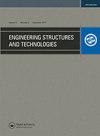Experimental investigation of steel equal angle subjected to compression
引用次数: 4
Abstract
AbstractThis paper presents pin-ended compression tests on steel equal angles. Three nominal section sizes were tested. Detailed measurements of material properties, residual stresses, and geometrical imperfections were conducted. The pin ended specimens were tested with a minimal eccentricity of L/1,000 applied about the minor axis to cause compression at the tips of the legs. The test data are compared with the Indian specifications for hot-rolled steel structures. The section capacities obtained from the column tests are found to be between 15 and 40% higher than those calculated according to the specifications. It is concluded that there is no need to include the additional eccentricity specified in the steel structures standards accounting for the shift of the effective centroid, and that the eccentricity of L/1,000, specified for all section classes, should be applied to slender sections only.钢等角受压试验研究
摘要本文介绍了等角钢的端部压缩试验。测试了三种标称截面尺寸。对材料性能、残余应力和几何缺陷进行了详细测量。销端试样在小轴上施加L/ 1000的最小偏心以在腿的尖端造成压缩。试验数据与印度热轧钢结构规范进行了比较。从柱试验中获得的截面承载力比根据规范计算的截面承载力高出15%至40%。由此得出结论:钢结构标准中规定的由于有效质心位移而产生的额外偏心不需要包括在内,所有截面等级规定的L/ 1000偏心应仅适用于细长截面。
本文章由计算机程序翻译,如有差异,请以英文原文为准。
求助全文
约1分钟内获得全文
求助全文

 求助内容:
求助内容: 应助结果提醒方式:
应助结果提醒方式:


